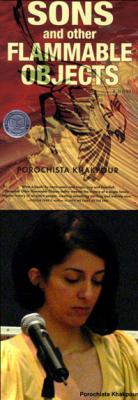به زبان فارسی
PICTORY
LATEST MUSIC
SEARCH
Counter-Narration from the Borderlands
by Tala Khanmalek
25-Aug-2008
Sons and Other Flammable Objects
by Porochista Khakpour
Review
Long before, and especially after 9/11 we have been bombarded with perverted and sinister images and ideas of the Middle East: the region, the peoples, the history, and the cultures. How do people who identify as Middle Eastern realize these images and ideas on which popular consciousness has been built, and how do we understand ourselves with or without them? Whether through the Axis of Evils’ comic relief, Suheir Hammad’s poetics, or the Philistines’ beats and rhymes, Middle Eastern communities have addressed the deep understanding of what it has meant to be Middle Eastern according to imperial eyes in creative and commanding ways. Expressions of resistance in conversation with new justifications of racism amongst the diaspora have presented a heterogeneous and complicated picture of the Middle East and Middle Eastern men and women-especially the novel.
Many of the novels and memoirs written by Middle Eastern peoples in the Americas have shadowed the “Kite Runner phenomenon,” sharing stories that reproduce and reaffirm monolithic images and ideas of the Middle East and Middle Easterners. Few aspire to tell another story, and those that do don’t usually make it to the esteemed new fiction tables greeting us at Barnes & Noble or Borders. It is probably no coincidence then that not too many folks have heard of Porochista Khakpour’s Sons and Other Flammable Objects. Dubbed the first truly “hyphenated” novel, Sons and Other Flammable Objects is written largely from the perspective of Xerxes, the American born son of Darius and Lala Adam. The bulk of the novel unfolds during the first months following 9/11 in a tumultuous and discombobulated New York, where Xerxes lives far away from his parents in Pasadena.
Caught amidst the borderlands of two seemingly contradictory identities, Xerxes struggles to hammer out an Iranian-American selfhood although 9/11 has transformed his subjectivity entirely. His relationship with an “almost half-Iranian” young woman forces Xerxes to address the chaos of the political climate and the chaos of his own life. Khakpour targets and explores the deep psychological effects of global realities on the relationships between Xerxes and himself as well as his family, specifically his father. It is worthy to note that the men in the novel are not heroes, they are people who grapple with the same and very real questions and experiences we do, particularly questions and experiences that Iranian-American youth have come face to face with in the post-9/11 era. For this reason and plenty more, Khakpour has contributed something entirely new and radical in the Iranian literary landscape.
There are no pomegranates to be found in her text, nor anecdotes of a dreamy and idealized Iran left behind. Instead, Khakpour divulges the raw and intimate hardships of an immigrant family who by no means satisfy the archetype of Iranian-ness in America. Sons and Other Flammable Objects is thus a counter-narrative in multiple and diverse ways; it makes vulnerable our own often untold yet collective social, political, and cultural formations and transformations in the United States and simultaneously resists pervasive notions of Middle Easterners in the mass media. Khakpour challenges stereotypes both within and outside of our community with an offering of something very palpable. Through the Adam’s many readers will surely feel that their thoughts and feelings have finally been written with brutal honest, impeccable wit, and dark humor.
RECENT COMMENTS
IRANIANS OF THE DAY
| Person | About | Day |
|---|---|---|
| نسرین ستوده: زندانی روز | Dec 04 | |
| Saeed Malekpour: Prisoner of the day | Lawyer says death sentence suspended | Dec 03 |
| Majid Tavakoli: Prisoner of the day | Iterview with mother | Dec 02 |
| احسان نراقی: جامعه شناس و نویسنده ۱۳۰۵-۱۳۹۱ | Dec 02 | |
| Nasrin Sotoudeh: Prisoner of the day | 46 days on hunger strike | Dec 01 |
| Nasrin Sotoudeh: Graffiti | In Barcelona | Nov 30 |
| گوهر عشقی: مادر ستار بهشتی | Nov 30 | |
| Abdollah Momeni: Prisoner of the day | Activist denied leave and family visits for 1.5 years | Nov 30 |
| محمد کلالی: یکی از حمله کنندگان به سفارت ایران در برلین | Nov 29 | |
| Habibollah Golparipour: Prisoner of the day | Kurdish Activist on Death Row | Nov 28 |



